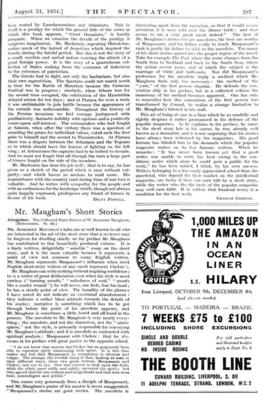Mr. Maugham's Short Stories
Altogether. The Collected Short Stories of W. Somerset Maugham. (Heinemann. 8s. Hd.) MR. SOMERSET haucrisn's tales are so well known to all who are interested in the art of the short story that a reviewer may be forgiven for dwelling chiefly on the preface Mr. Maugham has contributed to this beautifully produced volume. It is a finely written, delightfully " sensible " essay on the short
story, and it is the more valuable because it represents a point of view not common to many English writers.
Mr. Maugham represents Maupassant's influence when most English short-story writers of any merit represent Chekov's.
Mr. Maugham can write nothing without inspiring confidence ; he is a writer of great deliberation even when his style is most .careless (" burning mouth," " nakedness of soul," " mouth like a scarlet wound "); he will never, one feels, lose his head ; he has a steady point of view. The banality of the phrases I have noted do not indicate an emotional abandonment ; they indicate a rather blase attitude towards the details of his stories ; narrative is something which has to be got through before the point of his anecdote appears, and Mr. Maugham is sometimes a little bored and off-hand in the process. The anecdote to Mr. Maugham is very nearly every- thing ; the anecdote, and not the characters, not the " atmo- sphere," not the style, is primarily responsible for conveying Mr. Maugham's attitude; and it is anecdote as contrasted with spiritual analysis : Maupassant with Chekov : that he dis- cusses in his preface with great justice to the opposite school.
" I do not know that anyone but Chekov has so poignantly been able to represent spirit communing with spirit. It is this that makes one feel that Maupassant in comparison is obvious and vulgar. The strange, the terrible thing is that, looking at nom in their different ways, these two great writers, Maupassant and Chekov, saw eye to eye. One was content to look upon the flesh, while the other, more nobly and subtly, surveyed the spirit ; but they agreed that life was tedious and insignificant and that men were base, unintelligent and pitiful."
This comes very generously from a disciple of Maupassant, and Mr. Maugharn's praise of his master is never exaggerated. " Maupassant's stories are good stories. The anecdote is
interesting apart from the narration, so that it would secure attention if it were told over the dinner table ; and that seems to me a very great merit indeed." The best of Mr. Maughanf s stories too are anecdotes, the best are worthy of Maupassant, and his failure really to reach Maupassant's rank is partly his failure to stick to the anecdote. Too many of his short stories sprawl into the proper region of the novel. Take for example The Pool, where the scene changes from the South Seas to Scotland and back to the South Seas, where the action covers years, and of which the subject is the marriage of white and half-caste. Nor did Maupassant's preference for the anecdote imply a method which Mr. Maugham finds only too necessary : the method of the " yarn," of the first person singular. He defends the con- vention ably in his preface, but in a collected volume the monotony of the method becomes apparent. One has only to remember how this convention of the first person was transformed by Conrad, to realize a strange limitation to Mr. Maugham's interest in his craft.
This air of being at ease in a Sion which he so candidly and rightly despises is rather pronounced in his defence of the popular magazines. As he explains in his preface, he came to the short story late in his career, he was already well known as a dramatist, and it is not surprising that his stories have always been welcomed by the magazines. His good fortune has blinded him to the demands which the popular magazine makes on its less famous writers. When he remarks : " It has never been known yet that a good writer was unable to write his best owing to the con- ditions under which alone he could gain a public for his work," he has been misled, I think, by his own success. Writers belonging to a less easily appreciated school than the anecdotal, who depend for their market on the intellectual magazine, are lucky if they can earn £20 by a short story, while the writer who fits the taste of the popular magazine may well earn £200. It is seldom that financial worry is a condition for the best work.
GRAHAM GREEN-E.






































 Previous page
Previous page